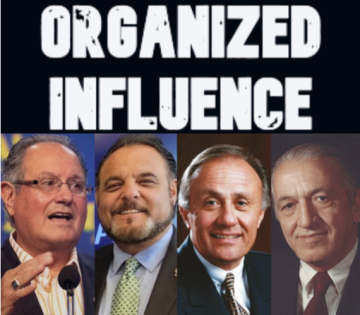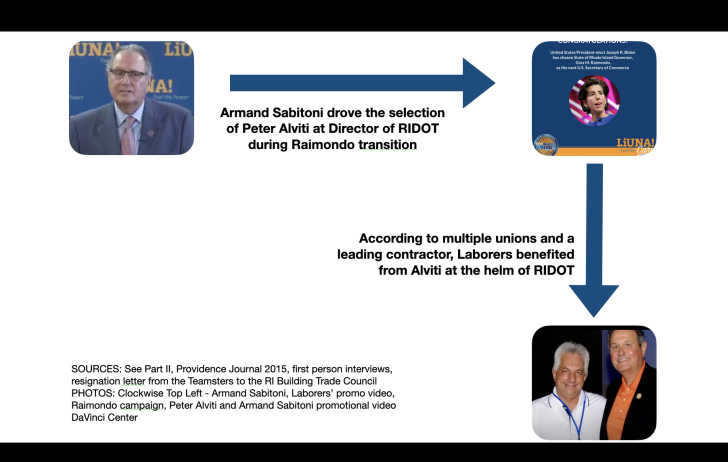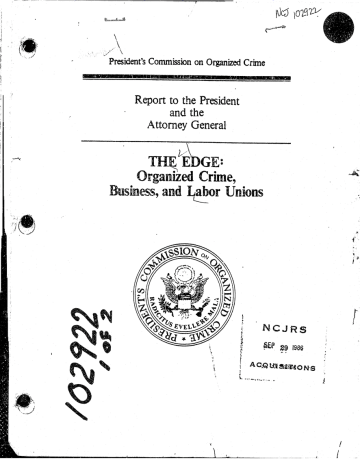ORGANIZED INFLUENCE: Two Families Control the Laborers — Coias & Sabitonis
Wednesday, March 06, 2024
The ongoing series "Organized Influence” tracks the political power of the Laborers’ International Union in Rhode Island and across the country. It follows the union's impact on who controls the State House and how the Rhode Island Department of Transportation is run.
This segment of the series by GoLocal, Part III, looks at the union's legacy and close ties to organized crime.
GET THE LATEST BREAKING NEWS HERE -- SIGN UP FOR GOLOCAL FREE DAILY EBLAST
Today, Robert Luskin is one of America's top defense attorneys in America, having represented Karl Rove, Lance Armstrong, and presently, U.S. Senator Bob Menendez.
Before he entered private practice, Luskin served as a prosecutor for the U.S. Department of Justice and was involved in multiple enforcement actions against the Laborers' International Union and La Cosa Nostra.
In an interview with GoLocal in late February, Luskin discussed his experience with the Laborers and Arthur A. Coia, the former union president.
"Obviously, there was a dominant relationship by [Raymond] Patriarca on the Laborers," said Luskin.
Patriarca was, for more than 40 years, the head of the New England crime family.
"[The Laborers] has always had an oversized influence in Rhode Island," Luskin added.
That influence by the Laborers for the past seventy years was dominated by two families — the Coias and the Sabitonis.
Over the past decade-plus, the Laborers’ International has grown its political influence in Rhode Island by developing close ties Governors Gina Raimondo and Dan McKee and that has allowed the union to flex its political muscle.
But this segment is about much more.
The Laborers placed its "man," Peter Alviti, as head of the Rhode Island Department of Transportation (RIDOT) in 2015 via Raimondo. He had little experience in building roads and bridges, but he was handpicked by Armand Sabitoni, the then-General Secretary-Treasurer of the Laborers.
The union has poured millions of dollars into political races in Rhode Island. As GoLocal unveiled, that included directing $600,000 to McKee’s election in 2022.
As a result of the Laborer’s influence, retaining their “union brother” Alviti to run RIDOT has been paramount — an agency that is now under review by the U.S. Department of Justice for the second time in four years.
Under Alviti’s tenure as the head of RIDOT, the Washington Bridge failed and as a result the state has been hit by a transportation and economic crisis.
But, the Laborers’ controversies started decades ago.
La Cosa Nostra and the Laborers
The union’s legacy, in part, is defined by the close relationship between Arthur E. Coia and New England crime boss Patriarca, according to federal law enforcement documents.
Arthur E. Coia, who died in 1993, was the father of Arthur A. Coia. Between the two, they held top posts either in Rhode Island or nationally from the 1940s through to the 1990s.
The senior Coia and Patriarca’s relationship dates back to the 1930s.
A story published in Washington Monthly in May of 1996 about legal machinations of the union and Coia’s son, the President of the Laborers in the 1990s, cited the longstanding friendship and criminal entanglements between the senior Coia and Patriarca.
“[Arthur A.] Coia's father also had other, sinister contacts. He had a relationship — casual, he insisted — with the legendary boss of New England organized crime, Raymond L.S. Patriarca, that dated to their youth in the 1930s. FBI wiretaps, planted in the early 1960s, crackled with the sound of Patriarca meddling in everything from Laborers' elections to decisions on who got kickbacks on union coffee machines. 'Hit them, break legs to get things your way,' Patriarca was overheard saying,"
FBI files secured by GoLocal unveiled that the government showed a concerted fraud scheme tied to insurance companies and union funds.
In 1981, Arthur E. Coia, his son Arthur A. Coia, Patriarca, another union official, and a former State Representative were indicted by the U.S. Department of Justice.
United Press International reported on September 26, 1981:
The heads of three of the nation's organized crime families plotted as far back as 1976 to steal millions of dollars from the huge Laborers International Union of North America by gaining control of its insurance business, federal grand jury indictments claim.
The indictments, handed up this week in Miami against reputed New England crime boss Raymond L.S. Patriarca, three union officials and a former Rhode Island state representative, charge the five men with conspiring to divert more than $1 million in union insurance funds to the mob.
They also claim the defendants were part of a larger scheme involving underworld families in Florida and Chicago to gain control of the 900,000-member union's insurance business. The five pleaded innocent Thursday in U.S. District Courts in Providence and Boston.
Sixteen other people were indicted in the case in June, including reputed underworld chiefs Santo Trafficante Jr. of Florida and Anthony 'Big Tuna' Accardo of Chicago.
Indicted this week were Patriarca, 73, of Johnston; Arthur E. Coia, 68, of North Providence, R.I., the No. 2 man in the Laborers Union; his son, Arthur A. Coia, 38, of Barrington, R.I., business agent for the union's Rhode Island General Council.
Also, Albert J. Lepore, 40, of Tiverton, R.I., a former state representative and law partner of the younger Coia; and Joseph J. Vaccaro Jr., 51, of Winchester, Mass., trustee of the New England Laborers International Training Trust Fund and president of the National Group Insurance Agency.
The indictment said Patriarca, in 1976, told convicted insurance swindler Joseph A. Hauser the insurance business of the Laborer Union would be controlled by 'The Family.'
It said Patriarca would control the Northeast, Trafficante would handle the South, and Accardo the Midwest.
The indictments said Patriarca allegedly met with Hauser several times to discuss ways to split up the union insurance business to make money for themselves.
Trafficante, Accardo and 14 others indicted in Miami in June were charged with conspiring to split $2 million in kickbacks on union trust funds.
Hauser is the star witness in the three-year racketeering probe.
The indictment said Hauser and Patriarca agreed they would set up or buy insurance and service companies for union trust funds, and would use their influence over those funds to funnel money into the new companies.
It said they would charge union members for the most expensive form of insurance, then use the premiums for 'kickbacks, payoffs, unearned salaries and fees and improper personnel expenses.'
Ultimately, the group was acquitted due to the fact the statute of limitations on the charges had expired. The union leadership dodged that legal bullet, but more troubles were coming.
Claims of Death Threats, Murders, and Influence of Organized Crime
After beating the 1981 federal charges, the younger Coia began his ascent up the leadership structure of the union.
But the union took another black eye.
The President’s Commission on Organized Crime released a 700-plus page report in 1986, outlining a series of disturbing series incidents tied to the Coias.
The blue-ribbon Commission's members included the then Democratic Chair of the House Judiciary Committee Peter Rodino, U.S. Senator Strom Thurman, and was chaired by Judge Irving Kaufman.
According to the Commission's report, “LIUNA secretary-treasurer Arthur Coia also tried to influence Robert Powell's decision not to seek the union's presidency. Powell was one of the few black leaders in a union whose membership is between 50 and 65 percent non-white. Powell testified under oath that Coia informed him that the 'Italians' had organized LIUNA, and no one outside that group could overtake control.”
“Powell understood this to mean that Coia was referring to a traditional organized crime group, not the ethnic Italians in the union's rank and file,” according to the report.
“Powell received other anonymous death threats. On one occasion, a dead rat was placed on his car. Later, a pair of dead pigeons was left in the same place. Threatening telephone callers asked Powell if his life insurance was paid up and whether he ‘liked breathing,’” according to the report.
“As a result of these threats, Powell gave false testimony in the lawsuit, which he recanted when questioned by the Commission. Powell was forced to take certain precautions, such as sending his wife to live in another city for over a year. He wore a bulletproof vest and carried a handgun. Powell declined to run for International president, and, within two years of Fosco's initial threat, he retired. During this same period, the union's comptroller believed his office and home phone might be tapped. He told the Commission that his employers were concerned about Ieaks."
Fosco preceeded Arthur A. Coia as the President of the Laborers' International Union of North America
"Other Laborers' officials have been murdered. For example, on January 17, 1982, 49-year-old Bienvenido Medina, the long-time recording secretary of the Philadelphia area Hod Carriers Local 332, was beaten to death by five masked men who visited his home in the middle of the night. Medina was murdered several days after he resigned his office and announced his candidacy for business agent of the local," said the report.
"The chilling effect of such violence cannot be lost on local leaders or rank-and-file union members," according to the Commission.
"Although LIUNA has not achieved the notoriety of the Teamsters' Union, it is nevertheless a union with clear ties to organized crime. This is particularly unfortunate because, perhaps more than any other group of workers, laborers need a strong and honest union. The Commission believes there is little chance that the LIUNA membership will be able to eliminate organized crime's influence, or control their union, if the current leadership or governance structure remains intact. The Commission believes that federal law enforcement agencies should give high priority to investigations of LIUNA and its locals," said the Commission's report.
READ PART 1: ORGANIZED INFLUENCE: Governor McKee and Armand Sabitoni’s Special Relationship
READ PART 2: ORGANIZED INFLUENCE - ALVITI: The Keys to the Scheme
COMING NEXT: Coia's ascension takes him to the height of national power. And, then, a downfall.
Related Articles
- ORGANIZED INFLUENCE - ALVITI: The Keys to the Scheme
- ORGANIZED INFLUENCE: Governor McKee and Armand Sabitoni’s Special Relationship
- Washington Bridge Report: Bridge Danger to Gano Street, Decay Has Gone on for Years and Not Detected
- Head of Federal Highway Is Visiting RI - He Previously Worked for Washington Bridge Contractor
- Federal Investigator on RIDOT Washington Bridge Failure Also Investigated 6/10 Contamination
- VIDEO: “These Bridges Aren’t Going to Inspect Themselves” - EP Resident Roasts RIDOT Failure
- Drivers Face Multi-Hour Delays, McKee-Alviti Scramble, Businesses Close, Holiday Parties Canceled
- Oversight Hearing on RIDOT Bridge Failure on Monday, Chair Says “We Can’t Take Action”
- Alviti Admits “Complete Rebuild” of Washington Bridge Possible — Latest in RIDOT Bridge Failure
- Alviti Grilled on Identical Washington Bridge Reports From Different Inspectors
- McKee’s Office Refuses to Answer Questions About Alviti’s Status on Washington Bridge Failure
- 6/10 Contractor Piling Up Tens of Millions of Dollars in Change Orders - Despite Alviti’s Promises
- RIDOT’s Alviti Says “Let Me Tell You Something Pal” to Constituent at Public Meeting
- EDITORIAL: Dirty RIDOT — Time for Alviti to Go (PUBLISHED 1 YEAR AGO TODAY)
- RIDOT Director Alviti’s Reconfirmation Opposed by Advocacy Groups at State House Hearing







